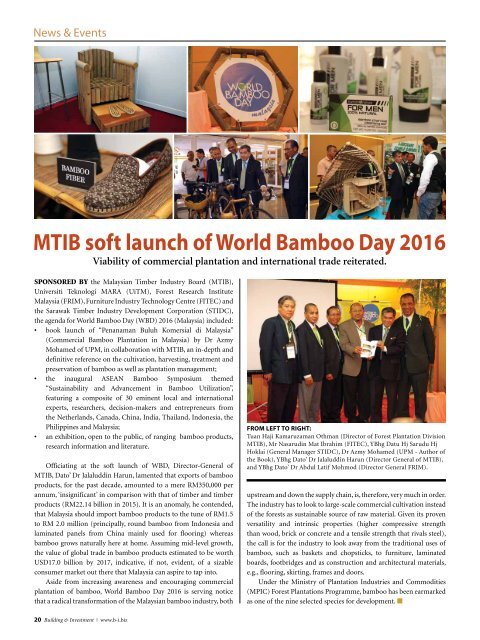Building Investment (Sep - Oct 2016)
The adage “when the going gets tough, the tough gets going,” aptly applies to property developers these days. While the market is soft, banks are stricter with loans and purchasers are hesitating, the bigger developers are using the lull period to re-organise, re-define their focus and to come out with even more attractive product offerings. The big players in both Malaysia and Singapore continue to be resilient...
The adage “when the going gets tough, the tough gets going,” aptly applies to
property developers these days. While the market is soft, banks are stricter with loans and purchasers are hesitating, the bigger developers are using the lull period to re-organise, re-define their focus and to come out with even more attractive product offerings. The big players in both Malaysia and Singapore continue to be resilient...
You also want an ePaper? Increase the reach of your titles
YUMPU automatically turns print PDFs into web optimized ePapers that Google loves.
News & Events<br />
MTIB soft launch of World Bamboo Day <strong>2016</strong><br />
Viability of commercial plantation and international trade reiterated.<br />
SPONSORED BY the Malaysian Timber Industry Board (MTIB),<br />
Universiti Teknologi MARA (UiTM), Forest Research Institute<br />
Malaysia (FRIM), Furniture Industry Technology Centre (FITEC) and<br />
the Sarawak Timber Industry Development Corporation (STIDC),<br />
the agenda for World Bamboo Day (WBD) <strong>2016</strong> (Malaysia) included:<br />
• book launch of “Penanaman Buluh Komersial di Malaysia”<br />
(Commercial Bamboo Plantation in Malaysia) by Dr Azmy<br />
Mohamed of UPM, in collaboration with MTIB, an in-depth and<br />
definitive reference on the cultivation, harvesting, treatment and<br />
preservation of bamboo as well as plantation management;<br />
• the inaugural ASEAN Bamboo Symposium themed<br />
“Sustainability and Advancement in Bamboo Utilization”,<br />
featuring a composite of 30 eminent local and international<br />
experts, researchers, decision-makers and entrepreneurs from<br />
the Netherlands, Canada, China, India, Thailand, Indonesia, the<br />
Philippines and Malaysia;<br />
• an exhibition, open to the public, of ranging bamboo products,<br />
research information and literature.<br />
Officiating at the soft launch of WBD, Director-General of<br />
MTIB, Dato’ Dr Jalaluddin Harun, lamented that exports of bamboo<br />
products, for the past decade, amounted to a mere RM350,000 per<br />
annum, ‘insignificant’ in comparison with that of timber and timber<br />
products (RM22.14 billion in 2015). It is an anomaly, he contended,<br />
that Malaysia should import bamboo products to the tune of RM1.5<br />
to RM 2.0 million (principally, round bamboo from Indonesia and<br />
laminated panels from China mainly used for flooring) whereas<br />
bamboo grows naturally here at home. Assuming mid-level growth,<br />
the value of global trade in bamboo products estimated to be worth<br />
USD17.0 billion by 2017, indicative, if not, evident, of a sizable<br />
consumer market out there that Malaysia can aspire to tap into.<br />
Aside from increasing awareness and encouraging commercial<br />
plantation of bamboo, World Bamboo Day <strong>2016</strong> is serving notice<br />
that a radical transformation of the Malaysian bamboo industry, both<br />
FROM LEFT TO RIGHT:<br />
Tuan Haji Kamaruzaman Othman (Director of Forest Plantation Division<br />
MTIB), Mr Nasarudin Mat Ibrahim (FITEC), YBhg Datu Hj Sarudu Hj<br />
Hoklai (General Manager STIDC), Dr Azmy Mohamed (UPM - Author of<br />
the Book), YBhg Dato’ Dr Jalaluddin Harun (Director General of MTIB),<br />
and YBhg Dato’ Dr Abdul Latif Mohmod (Director General FRIM).<br />
upstream and down the supply chain, is, therefore, very much in order.<br />
The industry has to look to large-scale commercial cultivation instead<br />
of the forests as sustainable source of raw material. Given its proven<br />
versatility and intrinsic properties (higher compressive strength<br />
than wood, brick or concrete and a tensile strength that rivals steel),<br />
the call is for the industry to look away from the traditional uses of<br />
bamboo, such as baskets and chopsticks, to furniture, laminated<br />
boards, footbridges and as construction and architectural materials,<br />
e.g., flooring, skirting, frames and doors.<br />
Under the Ministry of Plantation Industries and Commodities<br />
(MPIC) Forest Plantations Programme, bamboo has been earmarked<br />
as one of the nine selected species for development. ■<br />
20 <strong>Building</strong> & <strong>Investment</strong> | www.b-i.biz


















